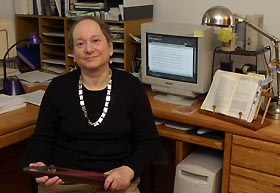|
This is an archived article.
For the latest news, go to the Advance
Homepage
For more archives, go to the Advance Archive/Search Page. |
||
|
Historian Studies Lives
Of 20th Century Working Women By Sherry Fisher
Growing up in the 1940s and1950s in a western Pennsylvania steel-mills town, she witnessed peoples' daily struggles. "They couldn't make ends meet, despite the supposed prosperity of the time," says Porter Benson, an associate professor of history. "Issues about working-class family provision were very much at the forefront of discussion."
It's not surprising, then, that Porter Benson would dedicate much of her academic life to studying the dynamics and history of gender, race, and class. Porter Benson's workplace is the study in her house, where stacks of documents on her desk wait to be examined. "Thousands," she says, pointing to the piles. Generated by the Women's Bureau of the U.S. Department of Labor and a variety of social agencies, the papers hold clues to what women in the 1920s and 1930s were grappling with in the work force. They are the core of Porter Benson's latest project: a book called Work Ethics: Women's Views of Paid Work in the U.S.A. 1925-1935. The book, composed of case studies of working women during the 1920s and 1930s, will examine how they experienced their occupations and how they managed their work lives. One of this year's fellows of the University's Humanities Institute, Porter Benson has recently been awarded a prestigious research fellowship from the National Endowment for the Humanities. The NEH fellowship will support the work on her book. Porter Benson says the issues women grappled with in the workplace 80 years ago are not much different from those of women today. "We're still trying to make the workplace comfortable and safe," she says, "and provide people with satisfying remunerative work that is compatible with a healthy family life." Three of the case studies involve women who did industrial work in their homes. These include women who worked on lace in Rhode Island, gloves in upstate New York, and children's dresses, mostly in San Antonio, Texas. A fourth study is of women in meat packing and slaughtering in Chicago, Kansas City, and East St. Louis. A fifth is of immigrant women in Philadelphia in a range of industries. The women who generated the reports were researchers and statisticians among the early generations of college-educated women involved with social reform. "They were concerned with the kinds of problems these working women faced in terms of child care, how they balanced housework and wage earning, and how they dealt with inadequate budgets," Porter Benson says. "One of the nice little sidebars to all this is the way that the personalities of the interviewers as well as the personalities of the women interviewed come through," she comments. "The agents were eager to understand the conditions of working women's lives and produce reports that would argue for legislation and social services to help them." Immersed in women's history for many years, Porter Benson has been involved with labor unions and other organizations that support wage-earning women. After earning a master's degree in American Civilization from Brown University, she taught at Bristol Community College in Fall River, Mass., where she introduced a course on U.S. women's history, was active in local unions, and began research on women's wage-earning. While working on a Ph.D. in history at Boston University, she worked for Threads, the Amalgamated Clothing and Textile Workers' Union humanities project for union members, funded by NEH. She was director of women's studies at UConn from 1993 to 1998. Her first book was Counter Cultures: Saleswomen, Managers, and Customers in American Department Stores, 1890-1945 (University of Illinois Press, 1986). A second book will be Household Accounts: Working-Class Family Economies in the Interwar U.S.A. (Cornell University Press, forthcoming). |
 rdinary people's daily
lives have always fascinated Susan Porter Benson.
rdinary people's daily
lives have always fascinated Susan Porter Benson.
